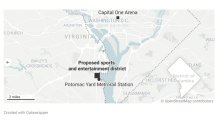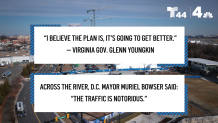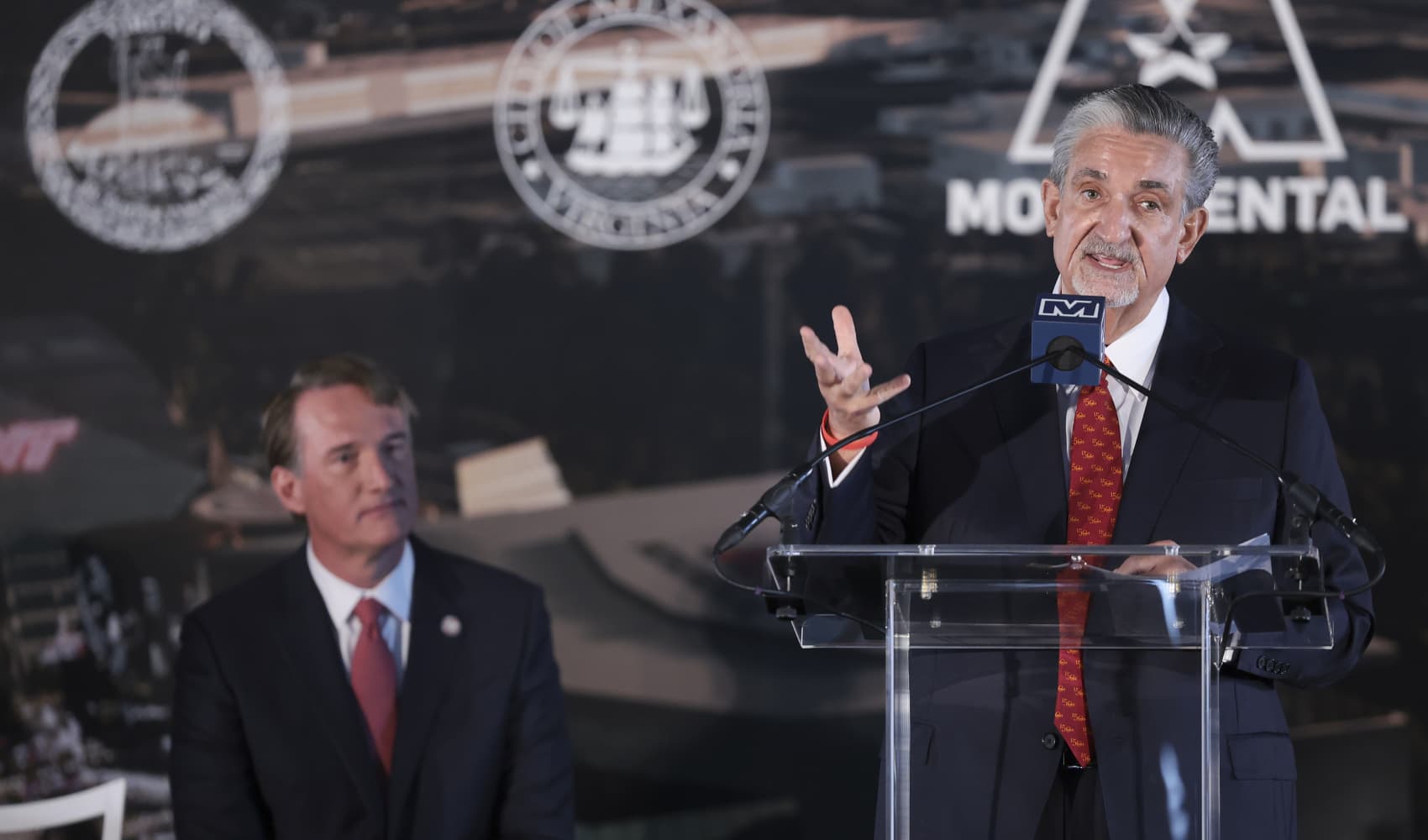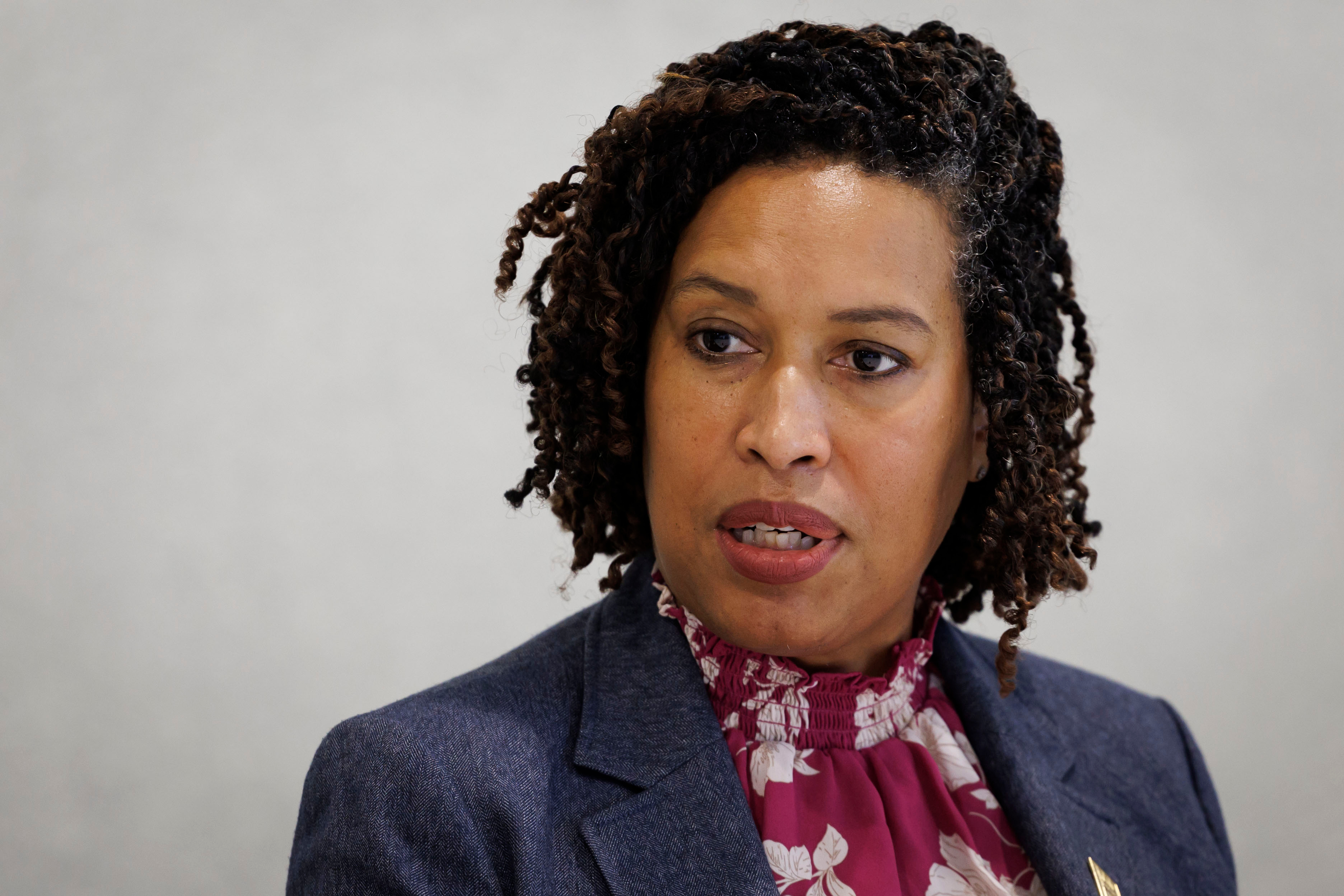The announcement of a tentative deal to send two of D.C.'s marquee sports teams across the Potomac River caught most DMV residents by surprise. It was only Monday afternoon when we learned Virginia leaders were looking to lure the Washington Wizards and Capitals into the commonwealth. Less than 48 hours later, the owner of the teams and Virginia's governor made a surprise announcement that it's all but a done deal.
The $2 billion plan would transform the rapidly developing Alexandria neighborhood of Potomac Yard. It's also poised to send shockwaves through downtown D.C., which is accustomed to the economic rewards of hosting tens of thousands of Cap and Wizards fans but has struggled with increased crime.
And it throws another ball into the air for a region that's trying to juggle a lot of major changes — including the FBI HQ's move to Maryland from D.C., and D.C.'s efforts to coax the Washington Commanders back from Maryland.
"National Landing Wizards doesn't quite have the same ring,” D.C. Mayor Muriel Bowser said, referring to a name frequently used by developers for a strip of neighborhoods that includes Potomac Yard.
▶️ WATCH BELOW: Yay or Nay? We asked around in Chinatown and Potomac Yard
In the leadup to Wednesday's announcement, D.C. and Virginia lawmakers proposed dueling multimillion-dollar bids to either transform the teams' Capital One Arena in the District, or spur the move across the river.
Then Ted Leonsis, owner of Monumental Sports and Entertainment — the company that owns the teams — and Virginia Gov. Glenn Youngkin announced they will work together to create a "world-class" entertainment district in Potomac Yard ("pending legislative approval and completion of definitive documents," a statement from Monumental noted).
Leonsis hyped something he said he wouldn't be able to get in D.C.: "70 acres and the ability to start with a clean slate."
The planned nine-million-square-foot entertainment district would be developed by JBG Smith, Youngkin said. Plans for the development include:
- an arena for both teams
- a corporate headquarters for Monumental Sports
- a media studio for Monumental Sports Network
- a practice facility for the Wizards
- a performing arts venue
- an expanded esports facility
- new retail, residential buildings and office space
Renderings: See proposed Monumental Sports entertainment district for Potomac Yard
"This is the most visionary sports and entertainment development in the world," Youngkin said, "bringing together entertainment, sports and technology in the most advanced innovation corridor in the United States: a once-in-a-generation and historic development for the commonwealth, sports fans, and all Virginians. The commonwealth will now be home to two professional sports teams, a new corporate headquarters, and over 30,000 new jobs – this is monumental."
But plenty of questions remain, including about Northern Virginia traffic … and the future of downtown D.C.'s Capital One Arena.
▶️ WATCH BELOW: 'It's a D.C. team. It should be in D.C.': Fans react to Caps' & Wizards' planned move
What kind of financial fallout would the District experience?
The move from downtown D.C. would be a major blow to a city that has struggled with empty office buildings and increased crime in the pandemic's wake.
The 20,000-seat Capital One Arena hosts a total of 84 games per year for the Caps and Wizards — nearly one-quarter of all the days in a year — and brings in tens of thousands of fans.
Monumental owns the arena itself but leases the land from D.C. Leonsis previously complained about the lease and this fall asked the District to cover $600 million in improvements to the building. Bowser said the District's $500 million proposal was their "best and final offer."
To have the teams leave D.C. within the next few years could be devastating to Bowser's post-pandemic comeback plan and to the neighborhood itself.
On Wednesday, Bowser said she and other D.C. sports fans are disappointed by the decision. She maintained that the District is the best place for the teams. More critically, Bowser said that losing the teams could cost the nation's capital as much as $25 million a year in tax revenue.
"We're very disappointed, but at the same time, we have to look at our assets and we're talking about five acres in the center of the District of Columbia. It's a great asset," she said.
Bowser expressed hope that the deal with Virginia could fall through, pointing out that leaders tried and failed in the past to bring baseball and football to Northern Virginia. However, Leonsis made it clear during a news conference with Youngkin and other leaders that he intends to go through with the move.
▶️ WATCH BELOW: 'It's all about expansion': Monumental Sports exec talks new arena, future of Capital One
What would happen to Capital One Arena?
Leonsis said he does want to keep running the aging Capital One Arena, which still serves as a major concert venue. His company also owns the Washington Mystics, which since 2019 has played at the relatively new Entertainment and Sports Arena in Southeast D.C. — but Leonsis said he would be interested in bringing the Mystics back to Capital One.
"My belief is that at Capital One Arena we can host women's sports," Leonsis said. "We've invested $200 million in the last 10 years in keeping Capital One world-class as an arena, and our intention is to expand here and keep Capital One Arena in Washington, D.C., a great place. We'll host concerts here. We'll host concerts there."
But Bowser was noncommittal about whether D.C. would put up hundreds of millions of dollars if the Capitals and Wizards weren't part of the deal, or whether she supports moving the Washington Mystics from their current arena east of the Anacostia River and back to Capital One.
"That is not what the proposal is," Bowser said.
And that's not considering the potential fallout to the surrounding neighborhood if the Mystics were to depart the Entertainment and Sports Arena.
The mayor acknowledged the city could not offer Leonsis a 70-acre campus like Potomac Yard, but she floated the possibility of providing high-profile land to keep the two teams.
"If they come back to us … at a later time, we may be able to talk about something different," Bowser said. "But if they want a campus style, it may take a couple of years, but we would have RFK and we would have the FBI [headquarters, which will be vacated after it relocates to Maryland]. So there are multi-acre sites in the District that aren't fully available at this point, but they could be."
With or without the Capitals and Wizards, Bowser said she's creating a taskforce to look at ways to revitalize the neighborhood.

What would happen with traffic in Alexandria? And can the new Metro station handle droves of fans?
Major questions also loom about how Alexandria would handle traffic from the planned arena in a location that already struggles with congestion, including around the nearby Washington Reagan National Airport.
About 25,000 vehicles per day use a stretch of Route 1 close to where the Capitals and Wizards would relocate. More than 50,000 vehicles per day use the nearby George Washington Memorial Parkway. Side roads in the area go through densely populated neighborhoods, and arena traffic likely would end up going through those residential neighborhoods as well.

Transportation sources with direct knowledge of the Monumental arena project told News4 that any major transportation plans for the project are in the very early stages of development.
Officials in two jurisdictions said very different things about the traffic situation in Potomac Yard:
"I believe the plan is, it’s going to get better," Youngkin said about the traffic.
Across the river, Bowser said, "The traffic is notorious."
It's true that the area around the Arlington-Alexandria border is getting some big transportation upgrades, including new bridges, better-timed traffic signals and fast-moving buses with dedicated lanes.
Youngkin touted the progress.
"There’s substantial resources that are going to be brought to bear to open up the area," he said. "Second of all, we’ve already had major advancements in multimodal access like the opening of the Metro stop, which is right here – you can see it right here. On top of that, the new VRE station is going to be right here. It’s going to stop about a mile up the road. And on top of that, there’s a big plan to open up access to all the major thoroughfares."
As part of the arena plan, $200 million in transportation improvements were announced, along with plans for a large underground parking garage.
But the new Potomac Yard Metro station, which opened this past summer, would be the only station to handle the crowds near the proposed arena.
▶️ WATCH BELOW: Metro GM says Potomac Yard station not equipped to handle arena crowds
And on Thursday, Metro General Manager Randy Clarke cautioned that the Potomac Yard station can't handle Caps and Wizards arena crowds as-is. With only one escalator and staircase on each platform, the station wasn’t designed with a stadium in mind.
"Clearly, we’d need some type of modification, I think, to handle an event of that nature," he said. "It’s kind of, like, one escalator, one stair approach on each platform."
That discussion comes at a time when Metro is trying to close a $750 million budget gap. One of the worst-case scenarios Metro is considering would be to actually shut down some stations with the lowest ridership — and currently, Potomac Yard is one of those stations on the list.
"Our proposal was 10 lowest and based on today’s ridership, I believe Potomac is in that top 10," Clarke said.
Metro is also floating the idea to increase fares to help close the budget gap. A final decision won’t be made until the spring.
"We've still got some work to do," Virginia Sen. Mark Warner said. "We need some additional plans on transportation, and because of the bipartisan infrastructure bill, the dollars we've got for VRE, for Metro, for additional road improvements, this stadium will be gotten to by those modes, but it will also be bike paths, walking, rapid bus — all of this will have to come together in a way that makes sense."
Meanwhile, Bowser touted Metro access as a big asset of the teams' current home. In the District, it’s possible to use multiple Metro stations and walk the rest of the way to Capital One Arena.
"We know how important Metro is and our transportation infrastructure is, and we believe we have the best setup to move 20,000 or 30,000 people in and out 80 to 100 times a year," Bowser said. "And so I think that will be a big part of the conversation."



